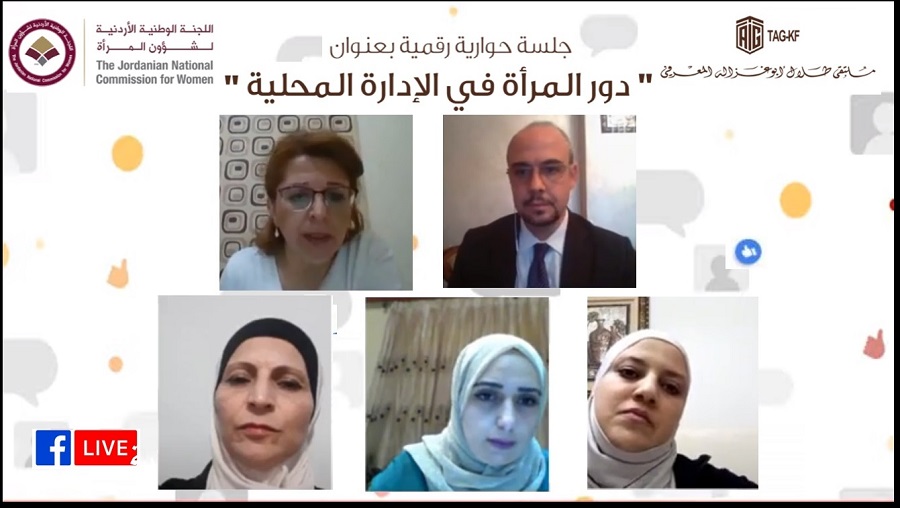‘Abu-Ghazaleh Knowledge Forum’ Holds ‘Women's Role in Local Administration’ Session
AMMAN – Talal Abu-Ghazaleh Knowledge Forum (TAG-KF), a member of Talal Abu-Ghazaleh Global (TAG.Global), organized a digital panel entitled ‘Women's Role in Local Administration’ in collaboration with the Jordanian National Commission for Women (JNCW); through livestreaming on the Forum’s Facebook page and aired on Talal Abu-Ghazaleh Business and Culture Radio & TV.
During the session, TAG-KF hosted Ms. Diana Haddadin, Project Manager for Supporting Women in Local Administration at the JNCW, Ms.Tharwah Al-Shebli, member of Mahis Municipal Council, Eng. Afaf Al Tamimi, member of the local council of West Irbid Municipality, and Eng. Razan Al-Jaafreh, vice-president of Rakeen local council and member of the Karak governorate council.
 The session, moderated by Mr. Fadi Daoud, the Executive Director of TAG-KF and Talal Abu-Ghazaleh Global (TAG.Global) Education and Youth Consultant, provided an opportunity for women members of the recently dissolved municipal councils to talk about their experience in municipal work.
The session, moderated by Mr. Fadi Daoud, the Executive Director of TAG-KF and Talal Abu-Ghazaleh Global (TAG.Global) Education and Youth Consultant, provided an opportunity for women members of the recently dissolved municipal councils to talk about their experience in municipal work.
Each of the speakers reviewed the achievements and challenges within the municipal councils system with an emphasis on women’s capacity to have an influential voice from the moment the decision of running for municipal office is made, until they become members and start working on site.
Furthermore, participants agreed that there are many challenges related to municipal services, noting that the society does not completely comprehend the nature of municipal work and its challenges including inefficiency of decision-makers in planning and follow-up as well as lack of resources.
At the beginning of the session, Ms. Haddadin briefed the session on the programs offered by JNCW and outlined the themes of the National Strategy for Women (2020-2025), as endorsed in March 2020, indicating that the fourth objective focused on the importance of ensuring equal opportunities for girls and women in public life and labor market as well as in enjoying economic independence.
For her part, Ms. Al-Shebli said: “I received support from the local community when I decided to participate in the municipal elections. There had been considerable support for women in the Mahis area where four women won the elections.’ She pointed out that the JNCW played a positive role in this win through the training courses it offered to women members of local councils.
“I took part in the elections upon the request of my townspeople, however, there were some opponents,” Al Tamimi said.
Concerning the challenges faced during her work, she noted that bureaucracy, the difficulty to reach the mayor and the lack of sufficient awareness on the importance of municipal council work, which many people still typically look at as improving road conditions and cleaning.
Eng. Al Jaafreh, who is one of the youngest members of the municipal councils, stated that because she faced several attempts to discourage her from running for elections, she decided to withdraw for the sake of those who are older than her in the governorate. Additionally, she pointed out that the Karak governorate lacks major development and investment projects needed for the advancement of the region.
For his part, Mr. Daoud pointed out that the digital virtual session was organized based on the belief of the Forum in the vision and mission ofthe Jordanian National Commission for Women to improve the situation of women in Jordan, and preserve and build on their achievements as well as to create a positive community culture and a supportive national environment for women’s role through a participatory approach with all concerned parties.
It is worth mentioning that the Jordanian National Commission for Women (JNCW) was established as a national machinery to promote women’s status in Jordan in accordance with the Cabinet’s decision No. 21/11/3382 in 1992. Chaired by HRH Princess Basma bint Talal, the Commission’s board includes representation of relevant ministers, civil society organizations and the private sector to promote the status of women and their participation in sustainable development.